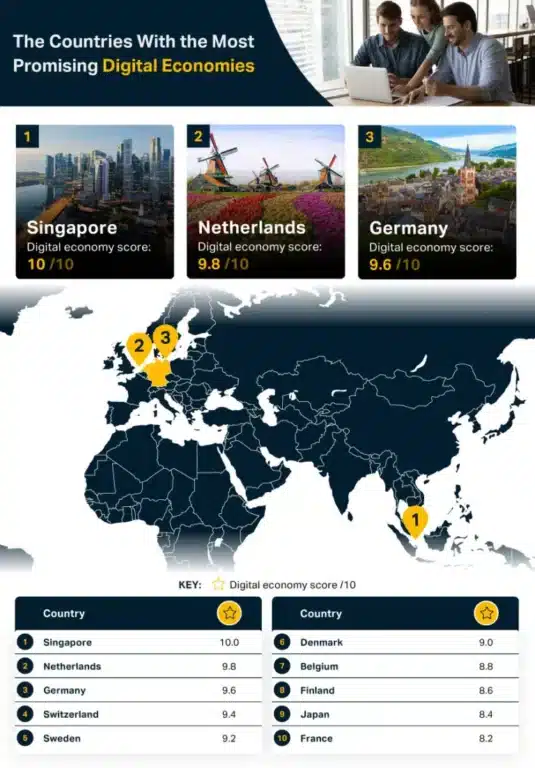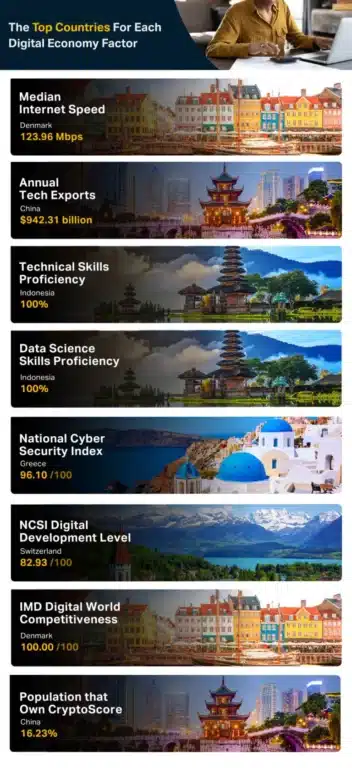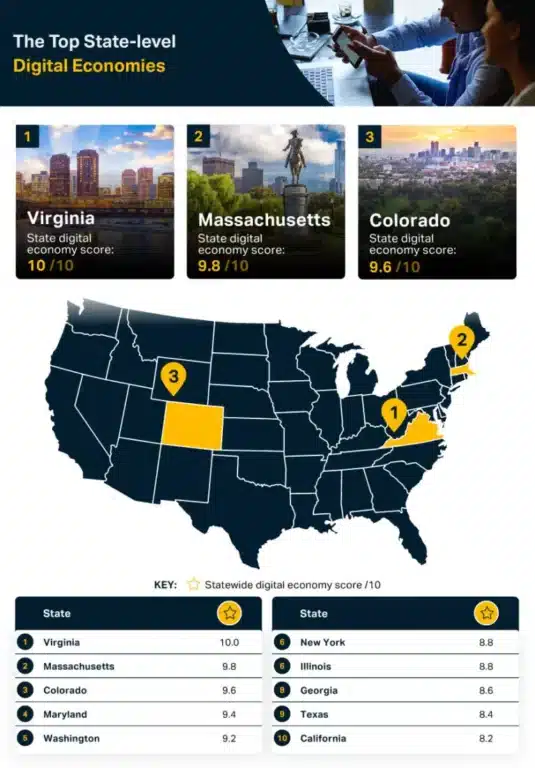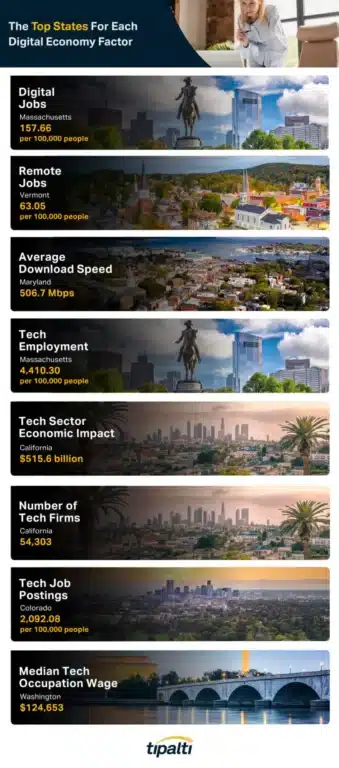
Digital Economy Report
Over the past few decades, the world has gone through one of the biggest technological leaps in human history. The shift away from traditional analog systems to digital technologies and automation has had widespread and profound effects on many aspects of humanity, allowing information to be accurately recorded, stored indefinitely, and transferred immediately to anywhere on the planet.
The shift to digitization has allowed us to improve many of the ways in which we tackle problems, whether this is breaking down barriers to communication or processing data in efficient and highly precise ways. This has had a huge impact on just about every industry and sector in the global economy, with new technologies continuing to be developed with every passing year.
Digital technology and the financial sector
Certain sectors, such as financial services, have benefited tremendously from digitization, as it has allowed the near-instant transfer of funds to any part of the planet. Digital technology allows us to continually develop new ways to make money easier to manage, whether you’re overseeing the accounts of a multinational corporation or simply keeping track of your personal finances.
This is particularly evident when you consider how businesses process payments, especially with the emergence of Commerce as a dominant force in retail, with technologies like ap automation greatly increasing the efficiency and reliability of business processes and providing solutions for mass payments to scale influencer payments and affiliate marketing programs.
Digital expertise is unevenly distributed
While the benefits of digitization are difficult to dispute, some parts of the world have been much faster to embrace digital technologies than others, giving them a clear economic advantage. With digital technologies being so widespread and deeply ingrained in modern life and the global economy, those countries that can emerge as experts in some aspect of digital technology will no doubt reap the benefits in the future.
With this disparity in digital expertise in mind, we wanted to investigate which parts of the world are best placed to succeed in the future digital economy. To this end, we have conducted a study in which we looked at a wide range of factors to reveal the most promising digital economies from all over the globe.
Countries with best digital economy outlooks

In this section, we compare over 50 countries with significant economies to see which has the greatest affinity for digital technology. To achieve this, we looked at eight separate factors from annual tech exports to cyber security expertise, assigning a Digital Economy Score to each country representing the relative promise of their digital economy.
1. Singapore – Digital Economy Score: 10
Singapore has the most promising digital economy, having achieved the highest Digital Economy Score of 10. This small city-state in Southeast Asia is a well-known hive of innovation and technological development. It has also been a leading nation in the advancement of blockchain technology which could dominate the digital landscape in the near future.
A large part of the Singapore economy comes from the export of integrated circuits, or microchips, which are a key component of many electronic devices such as computers, making it an important player in the creation of hardware that supports the digital economy. Despite Singapore’s diminutive size, it is the fifth largest exporter of integrated circuits in the world, with exports in 2020 worth $62.7 billion, while total tech exports reached $193.93 billion in the same year.
2. Netherlands – Digital Economy Score: 9.8
The Netherlands has the second most promising economy when it comes to digital, having received a Digital Economy Score of 9.8 out of 10. While many might associate the Netherlands primarily with horticulture due to the country’s huge flower industry, which accounts for roughly 60% of the global market, the Dutch have a long history of being technological innovators and savvy businesspeople.
From our study, we found that the Netherlands scored well across the majority of factors investigated. The country placed among the top 10 nations for proficiency in both data science and technology skills, and average internet speeds of 70.32 Mbps were the 4th fastest in our study, allowing quick and easy access to online services.
3. Germany – Digital Economy Score: 9.6
The third most promising digital economy in our study is Germany, which earned a Digital Economy Score of 9.6. Germany is the economic powerhouse of Europe and has a GDP of roughly $4.26 trillion, making it the largest economy in Europe and the fourth largest in the world. With this in mind, its sheer economic size is enough to give it a strong advantage when comparing different countries’ digital economies.
Germany is the second largest exporter of technology in the world with total exports in 2021 of $209.74 billion, a figure only surpassed by China. Germany also performs well in most other factors, especially cyber security, for which the country ranks 6th with a National Cyber Security Index score of 90.91. However, Germany’s median internet speed of 29.64 Mbps prevents the country from placing higher in our ranking.
The top countries for each digital economy factor

Here we can see which countries were able to top the table for each specific factor we looked at while calculating their Digital Economy Scores.
Median Internet Speed – Denmark – 123.96 Mbps
Denmark has the fastest median internet speed of any country in our study at 123.96 Mbps. This is 11.91% higher than second place Switzerland, where the average internet speed is 110.77 Mbps.
Annual Tech Exports – China – $942.31 billion
China has by far the highest annual tech exports at $942.31 billion, which is almost five times more than that of Germany, which took second place with annual tech exports of $209.74 billion.
Technical Skills Proficiency – Indonesia – 100%
Indonesia is the country with the highest technical skills proficiency in our study, receiving the top score of 100% in Coursera’s Global Skills Report. The next highest-scoring country in our study was Japan, which received a score of 98%, just beating Denmark which took third place with a technical skills proficiency rating of 97%.
Data Science Skills Proficiency – Indonesia – 100%
Indonesia also claimed the top score of 100% for data science skills in Coursera’s Global Skills Report. Finland claimed second place with a score of 98% while Denmark and Switzerland tied for third place with a score of 97%.
National Cyber Security Index Score – Greece – 96.10
The country that scored the highest in our study on the National Cyber Security Index was Greece, which received a rating of 96.10. Three countries, Belgium, Lithuania and Estonia, were then tied for second place with a rating of 93.51.
NCSI Digital Development Level – Switzerland – 82.93
Switzerland is the country with the highest NCSI Digital Development Level in our study, having received a rating of 82.93. This was closely followed by Denmark with a score of 82.68, and South Korea with a score of 82.23.
IMD Digital World Competitiveness Score – Denmark – 100.00
The highest scoring country on the IMD Digital World Competitiveness was Denmark, receiving the top score of 100, while the United States and Sweden both tied for second place with a score of 99.81.
Population that Own Crypto – China – 16.23%
Despite widespread bans on crypto services and transactions in the country, China appears to have the largest proportion of its population owning cryptocurrency at 16.23%. This is followed by the United States, where 13.38% of people own crypto, and Singapore, where this figure sits at 11.05%.
The top state-level digital economies [USA]

In a country as large and diverse as the United States, with culture and economic activity varying greatly from place to place, each state’s economy is unique. With this in mind, we also wanted to compare how state-level digital economies in the USA compare in terms of their promise and potential.
To compare the digital economies in different US states, we have again looked at eight separate factors to create an overall State Digital Economy Score by which the states will be ranked. However, these factors differ from those included in the national section, so direct comparisons cannot be made between state and national scores.
Virginia is the state with the most promising digital economy, having received the top State Digital Economy Score of 10. Virginia is an East Coast state with a diverse economy and a strong business outlook, being repeatedly voted the best state for business in CNBC’s state competitiveness rankings. With this in mind, Virginia appears to be a dynamic state that can quickly adapt to new technologies and make the most of the digital economy.
Virginia appears to be a state with a large number of job opportunities in digital occupations, with a snapshot of jobs related to “digital” posted on Indeed showing there are 125.09 digital-related jobs available per 100,000 residents, the third highest rate in the country.
The state also has the second-highest average download speed of 505.6 Mbps, the fifth-highest number of tech firms in the country at 20,600, and the second-highest number of tech job postings throughout all of 2021, with 1,861.87 per 100,000 people.
2. Massachusetts – State Digital Economy Score: 9.8
In a very close second place, with a State Digital Economy Score of 9.8, is Massachusetts. This Northeastern coastal state is known for its high number of top-class universities and colleges, including the world-renowned Massachusetts Institute of Technology (M.I.T.), and is the state with the highest proportion of its residents to have received bachelor’s degrees. This high level of education implies that the residents of Massachusetts should be poised to take advantage of the technologically-focused digital economy.
Massachusetts performed very well for the majority of factors in our study, and is the state with the highest number of digital-related job postings per 100,000 people, as well as having the largest number of tech employees compared to its population. In addition to this, Massachusetts offers tech employees the third highest average salary in the country of $105,721, helping it to attract some of the best minds to power the state’s digital economy into the future.
3. Colorado – State Digital Economy Score: 9.6
In third place, with a State Digital Economy Score of 9.6, is the Western state of Colorado. Well-known for National Parks, featuring diverse native wildlife and beautiful landscapes, Colorado is probably not the first state to spring to mind when discussing digital economies. However, the Centennial State performed strongly in many different factors, and is the state with the highest number of tech job listings per 100,000 residents in 2021, suggesting that the digital economy is set to surge in this part of the Mountain West.
Colorado also has the fourth highest number of digital-related job postings at 123.17 per 100,000 people, as well as the fourth highest rate of tech employment with 4043.85 tech workers per 100,000 people.
The top states for each digital economy factor
Here we can see which state performed the best for each individual factor, regardless of their overall State Digital Economy Score.

157.66 per 100,000 people
Massachusetts is the state with the highest number of digital jobs posted on Indeed compared to its population at the beginning of 2023, with 157.66 digital job listings per 100,000 people. This is 330.4% higher than the state with the fewest digital job advertisements, Mississippi, where there were just 36.63 postings per 100,000 people.
Best State for Remote Jobs – Vermont
63.05 per 100,000 people
Remote working is only made possible by digital technology and has been growing exponentially since the Covid pandemic of 2020. Vermont is the state that has embraced remote working the most, with 63.05 remote jobs posted per 100,000 residents. At the other end of the scale, Mississippi again has the lowest rate of job postings, with just 13.54 remote jobs listed per 100,000 people.
Best State for Average Download Speed – Maryland
506.7 Mbps
The state with the highest average download speed was Maryland at 506.7 Mbps, though Virginia took a very close second place with download speeds of 505.6 Mbps. Surprisingly, the state with the lowest average download speed was California, where it was recorded as only 93 Mbps.
Best State for Tech Employment – Massachusetts
4,410.30 per 100,000 people
The state with the highest level of tech employment in the country was Massachusetts, where 4,410.30 people per 100,000 are employed in a tech occupation. Washington claims second place with 4,282.05 people per 100,000 working in tech, while Mississippi has the lowest rate of tech employment at 922.57 people per 100,000.
Top State for Tech Sector Economic Impact in USA – California
$515.6 billion
The state where the tech sector has the biggest economic impact is California, with the tech industry being worth an incredible $515.6 billion. The Texas tech sector has the second largest economic impact at $142.8 billion, with New York in third place with a tech sector worth $140.4 billion. In contrast, Wyoming has the lowest-valued tech sector worth just $900 million.
State with Highest Number of Tech Firms California
54,303
California is the state with the highest number of tech firms in the country with a total of 54,303. Texas has the second-highest number with 39,299, while Florida takes third place with 32,760. At the other end of the scale, Alaska has just 768 tech firms in the state, while Wyoming and North Dakota are the only other states to have fewer than a thousand.
State with Highest Number of Tech Job Postings – Colorado
2,092.08 per 100,000 people
Colorado had the highest number of tech job postings in 2021 when compared to its population, with 2,092.08 per 100,000 people. This is followed by Virginia with 1,861.87 tech job postings per 100,000 people, and Massachusetts, where there were 1,608.69. The state with the fewest tech job postings was Mississippi, where there were just 343.12 tech job postings per 100,000 residents.
State with Highest Median Tech Occupation Wage – Washington
$124,653
The state which pays its tech workers the highest average salary is Washington, where the median tech occupation wage is $124,653. This is followed by California, where tech workers earn a median wage of $116,729, while Massachusetts takes third place with a median tech wage of $105,721. The state where tech workers earn the least is Wyoming, where the median tech salary stands at just $64.075.
Methodology and Resources
We wanted to find out which countries and US states had the most promising digital economies. To do this, we needed to compare a range of different factors related to digital economies and combine them into a single score from which a winner could be drawn.
For the international section, we included all countries within the EU, OECD, and G20, as well as several other countries with highly developed economies. We then recorded the median internet speeds found in each country according to the Fair Internet Report. Next, we recorded each country’s National Cyber Security Index score and Digital Development Level as published by the e-Governance Academy Foundation.
Additionally, we collected each country’s Technical Skills Proficiency and Data Science Skills Proficiency from Coursera’s Global Skills Report, their Digital Competitiveness Score from IMD’s World Digital Competitiveness Ranking 2022, the proportion of each country’s population that owns crypto from TripleA, and the total value of tech exports for each country in 2021 using World Bank data.
If any country was missing data for a factor it was removed from the comparison, except in the case of tech exports where 2020 data was used if 2021 data was not available. The data for all eight factors were then combined into a single score, giving each factor equal weighting and allowing us to rank the remaining 51 countries.
For the state comparison, we used a different set of factors and sources as comparable data was not available. We first used Indeed.com to find the number of jobs posted that included the term “digital”, as well as the number of jobs listed as being remote. We combined this with population data from the U.S. Census Bureau to calculate rates of job posts per 100,000 for each.
We then used the State of the Tech Workforce report by The Computing Technology Industry Association (CompTIA) to record each state’s median tech occupation wage, the total number of tech firms, and the tech sector’s economic impact. We also collected the number of tech job postings in 2021 and the total size of each state’s tech workforce, both of which were then calculated as a rate per 100,000 people in each state.
Finally, we recorded each state’s average internet download speed from BroadbandNow. We then combined all eight factors into a single equally weighted score and ranked them accordingly, revealing the states with the most promising digital economies.